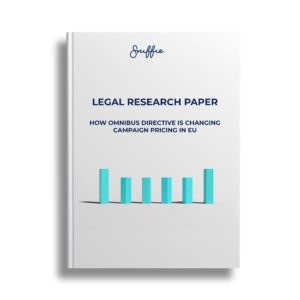This blog post is written in cooperation with ecommerce.legal, the Polish legal firm.
Introduced as part of the EU’s ‘New Deal for Consumers’, the Omnibus Directive is an important piece of European legislation aimed at adapting consumer protection rules to new market realities. Its main objective is to promote ethical business practices and strengthen consumer rights across the European Union.
In our previous posts, you may have learnt about the obligations arising from the rules established under the directive and what to look out for from the perspective of a trader starting to sell online. We’ve especially discussed the role of transparent pricing during discounts. As some time has now passed since the implementation of the directive, in this post we will take into details of how the regulations work in practice and how stores have adapted to the new legal and market reality. We highlight the case of Zalando, which was found in violation of regulations by Poland’s Office of Competition and Consumer Protection (UOKiK).
UOKiK activities in Poland
The Office of Competition and Consumer Protection (UOKiK) plays a key role in protecting consumer rights in Poland, especially in the context of the growing importance of e-commerce. One of the most important areas of its activity is precisely the monitoring of the enforcement of the provisions stemming from the Omnibus Directive, which introduces significant changes in terms of price transparency, as well as the protection of consumer interests against unfair commercial practices. If violations are found, the President of the UOKiK, as a central government administration body, has a wide range of powers to supervise the market and take legal action in situations of infringement.
Case of Zalando
In 2023, the activity of the UOKiK increased significantly, with the authority conducting detailed monitoring of online platforms to check their compliance with the new requirements on commercial practices, including in particular transparency and providing comprehensive information to users of online platforms.
The Omnibus Directive introduces, among other things, the obligation to inform consumers whether the seller on the platform is an entrepreneur or a private person. It also requires a clear division of responsibilities between the platform and the seller, such as regarding delivery and payment. These provisions are meant to give consumers easy access to key information, thereby enhancing their protection, especially in matters related to complaints.
As a result of the inspections, violations of the information obligations were found in the case of nearly 20 traders. Among these platforms, UOKiK focused particular attention on Zalando, one of Europe’s largest, most innovative platforms for the sale of clothing, footwear and accessories. This e-platform currently operates in more than 20 countries, offering consumers a wide range of products from both international and local brands.
Despite calls from the President of the UOKiK, Zalando failed to implement required changes in consumer information communication. Issues included the lack of clear information as to whether the offer was from a trader, which could cause confusion for consumers. As a result, Zalando’s customers may have been left without access to crucial information and may have faced difficulties in knowing whom to contact in the case of withdrawal from a purchase, or where to send returned goods. As a consequence, such activity made it difficult for them to make conscious shopping decisions. The President of the UOKiK, Tomasz Chróstny, took appropriate action by initiating proceedings against the company in July last year, filing charges of violating the collective interests of consumers against Zalando and other platforms, such as Booking and Travelist.
This action resulted in an administrative decision that obliged the platform to make changes to its websites in relation to its information obligation under the Omnibus Directive. As compensation for the infringement of consumer interests, Zalando is required to grant vouchers worth PLN 40 to all customers who purchased goods from its platform partners after January 1st 2023. The vouchers will be redeemable within six months on subsequent purchases and are eligible for Zalando goods – including those already discounted.
The takeaway for ecommerce retailers
The case of Zalando illustrates the seriousness with which European authorities are enforcing compliance with the Omnibus Directive. For e-commerce retailers, this is not just a cautionary tale – it’s a clear indication of how consumer protection regulations are evolving.
Consumers are now better informed and have higher expectations of the platforms they shop from. Non-compliance, as seen in Zalando’s case, not only leads to potential legal penalties but also undermines consumer trust – an essential factor for any business’s long-term success.
Cases like this serve as a reminder that maintaining compliance with such regulations goes beyond avoiding penalties; it helps build customer loyalty and strengthens brand reputation. As the e-commerce landscape continues to evolve, staying ahead of regulatory changes and demonstrating a commitment to transparent, ethical business practices will give retailers the edge they need to thrive in a competitive market.
For any retailer looking to foster trust and avoid the pitfalls of non-compliance, now is the time to take proactive steps toward integrating these consumer protections into daily operations. Ensuring that your platform is fully aligned with the Omnibus Directive can help your business sidestep legal issues while enhancing your relationship with your customers.
Prepare your pricing for compliance with our Omnibus Directive ebook
Our free legal research paper provides an in-depth guide on preparing your pricing to comply with the Omnibus Directive. For additional assistance in ensuring compliance within your pricing ecosystem, read more on our Omnibus Compliant Pricing Campaign Tool.

What next?
Familiarize yourself with the specific regulations your country has implemented to comply with the Omnibus Directive. Understanding these local rules is essential for ensuring your business remains compliant and avoids potential penalties.
We offer a wealth of resources on the Omnibus Directive, particularly regarding pricing to help guide you: https://www.sniffie.io/omnibus-app/. If your e-commerce store operates on Shopify or BigCommerce, don’t hesitate to download the Omnibus app, which automatically displays the correct lowest prior price, ensuring pricing transparency for your customers.
For those of you in Poland, don’t hesitate to reach out to Ecommerce Legal for further assistance.


